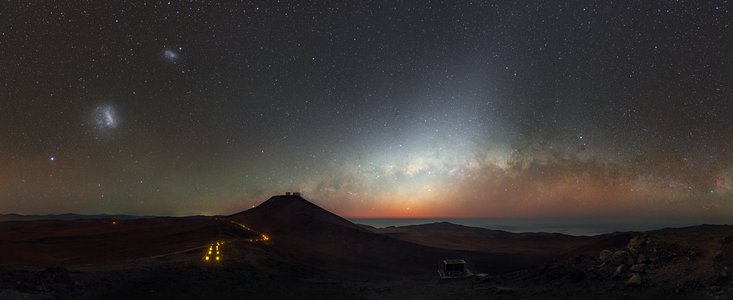Announcement
ESO supports charter for safe and sustainable space development
6 November 2023
Spearheaded by the European Space Agency (ESA), the Zero Debris Charter aims to address the increasing risks of space debris in Earth’s orbit. Released today at the Space Summit 2023 in Seville, Spain, the charter represents a collaboration between more than 40 space stakeholders, including the European Southern Observatory (ESO). Crucially for ground-based astronomical organisations like ESO, the charter recognises the adverse effects space debris can have on dark and quiet skies and seeks to mitigate them “to the greatest possible extent”.
The Zero Debris Charter is an important agreement outlining both principles and actions to prevent and mitigate space debris — the defunct objects in Earth’s orbit such as dead satellites, rocket fragments or other broken-up machinery. As recognised in the charter, space debris can compromise the safety of space activities, as well as any technological or social benefits that these activities provide to humankind.
The agreement comes at a time when the space industry is experiencing rapid expansion, making space debris a growing concern for space companies and agencies, but also for ground-based astronomy organisations like ESO.
In the development of the charter, ESO promoted the inclusion of protecting dark and quiet skies in the guiding principles — a cause ESO has actively campaigned for in numerous international settings, including work with the International Astronomical Union’s Centre for the Protection of the Dark and Quiet Skies from Satellite Constellation interference.
Dark and quiet skies — referring to the protection of the night sky from excess artificial light and radio emissions — are a requirement for ground-based observatories. Space debris jeopardises astronomical observations by artificially brightening the sky. As well, spacecraft, including those possibly used for debris mitigation techniques, can produce interference through the unintended reflection or emission of radiation.
In developing this charter, ESA has successfully brought together a diverse community of space stakeholders, including industry and government agencies, international organisations, universities and research centres, non-profit foundations and more. The guiding principles agreed upon aspire to reduce and mitigate the adverse effects of debris on both the environment and the sky, as well as improve our understanding of the objects swirling around in orbit. To do so, targeted measures are outlined for 2030, including removing derelict objects and improving data collection on debris. ESO will work with ESA to ensure the intent of the charter is captured into ESA standards for future missions.
The charter is now open to other organisations and companies for signing. Join the community of signatories making space safe and sustainable for the future here.
Links
Contacts
Bárbara Ferreira
ESO Media Manager
Garching bei München, Germany
Tel: +49 89 3200 6670
Email: press@eso.org
About the Announcement
| Id: | ann23018 |

